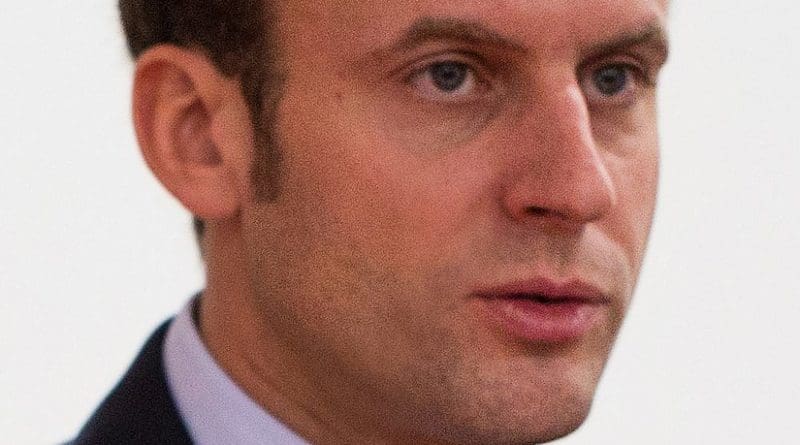Macron’s Mideast Diplomacy Has Its Limits – OpEd
By Arab News
By Randa Takieddine*
France’s desire to be an active player in the Middle East is generally welcomed in the region. With this in mind, French President Emmanuel Macron has been moving cautiously amid various crises in which those who violate international law — mainly Russia, Turkey, Iran and Israel — have an advantage on the ground.
In Lebanon, Iran’s proxy Hezbollah is prevailing; in Syria and Libya, both Russia and Turkey are players; while in Palestine, Israel disregards international law in its dealing with the Palestinian people.
Nevertheless, in this Middle East quagmire, the French president keeps trying.
When Macron called his Lebanese counterpart Michel Aoun just after the formation of the new Hassan Diab government, he told him that France will not let Lebanon down on condition that the new government implements drastic reforms needed to win support. It is typical for a French leader to feel a historical responsibility toward Lebanon, a country where Lebanese Christians, in particular, have looked to Paris for protection.
Macron, like his predecessors, tried at the outset of his leadership to do something for Lebanon. However, he is the only French leader who after almost three years of his term has still not visited the country as president because of the complexity of the situation there. Nevertheless, the French president has used all his political influence in Europe to stage the Cedre summit in Paris in April 2018, winning more than $11 billion in pledges to help Lebanon’s struggling economy.
The conference, which was attended by former Lebanese Prime Minister Saad Hariri and his Foreign Minister Gebran Bassil (yesterday’s allies, today’s enemies), demanded drastic government reforms and more financial transparency. However, nothing was done since 2018 despite numerous French warnings to the Lebanese government. The popular uprising that began on Oct. 17 reflected the deep frustration of the Lebanese with its failed political class, its corruption and disregard of public needs.
After the uprising, Macron organized another meeting of the international support group for Lebanon. It was not an easy task since many countries and financial institutions doubt that Lebanon’s political leadership will implement the requested reforms.
Macron may not want to let Lebanon down — but he cannot save the country from financial collapse on his own. The Diab government is still debating whether to repay a Eurobond debt of $1.2 billion due in March. If Lebanon decides against paying, the French believe that Beirut can organize a default via an IMF program that will open the door to other financial institutions to help.
But Hezbollah does not want IMF help, and the pro-Iranian party has told France that an IMF program is like “financial colonialism.” The French believe that Lebanon has no alternative. A negotiated program with the IMF will be tough to implement, but will at least ensure strict transparency, which bothers Hezbollah whose underground economy and corruption will be left exposed. The offer to help Lebanon by Iran’s Ali Larijani during his recent visit to the country is an additional hurdle to any international or Gulf help to Lebanon.
Recently Aoun told a French magazine: “France will not let us down.” But the Lebanese president neglected to say that France’s promise is conditional on reforms that the Lebanese who have so far failed to implement. Similar hopes are expressed by almost all in the international community. France can’t stop the Lebanese financial collapse on its own. It can help finance some Lebanese imports, but cannot step in to salvage Lebanon’s enormous debt. Macron has been actively trying to help Lebanon, but the Lebanese political class has failed to help itself.
In Syria, Macron’s priority is to stop the slaughter in Idlib and help displaced Syrians. But Idlib is now a Russian-Turkish problem. In Syria’s northeast, a Turkish offensive against the Kurds was carried out with Russian approval and support, while in the northwest, Turks are fighting a Syrian regime backed by the Russians.
Macron tries hard to maintain a dialogue with Russian President Vladimir Putin over humanitarian assistance, but France knows Russia will support Assad’s reconquest of his country at any price.
In Libya, Macron wants a political solution to end the chaos. He was the first to push for a reconciliation between Khalifa Haftar, head of the Libyan National Army, and the Tripoli government headed by Fayez Al-Sarraj. But Turkish interference in the war-torn country has destroyed all attempts at a cease-fire.
France considers Turkey’s involvement in Libya a danger and fears a strengthening of Libyan institutions linked to the Muslim Brotherhood.
On the Israeli-Palestinian question, the French said diplomatically that they welcome US attempt to find a solution to the conflict, with Macron reconfirming his commitment to the two-state solution on the basis of international law. France’s weight on this conflict is limited by the historical US-Israeli alliance which has been made stronger by the Trump-Netanyahu “deal of the century.”
- Randa Takieddine is a Paris-based Lebanese journalist who headed Al-Hayat’s bureau in France for 30 years. She has covered France’s relations with the Middle East through the terms of four presidents.

